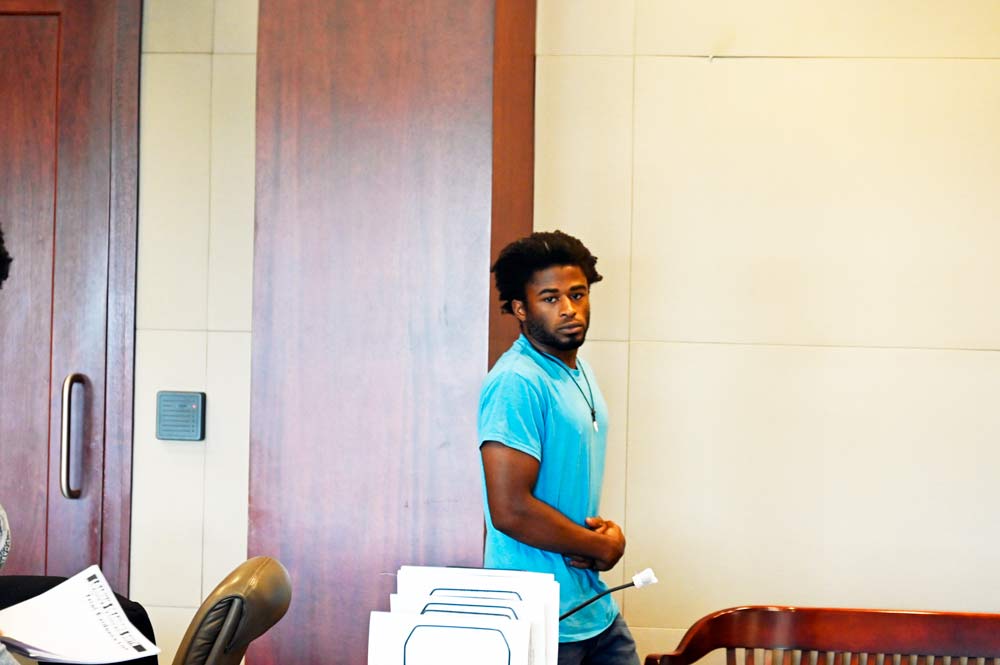
The court, the prosecution and the defense all but spelled out the catch-22 facing L’Darius Smith and people like him–people in deep and recurring mental health crises trying to navigate the unforgiving world of probation, the necessity of multiple jobs, the responsibilities of parenting, and the challenges of keeping up with treatment, assuming it’s available.
For all that, the court on Thursday still sentenced Smith to 36 months on a minor, almost ridiculous probation violation, sending him to state prison, an incubator and accelerant of mental health crises from where inmates rarely emerge less damaged than when they went in.
Smith’s sentencing is emblematic of individuals whose traumatic mental health problems are insufficiently treated either because of their own failings to keep up or because of a thin and porous mental health infrastructure that leaves it entirely up to troubled individuals to manage their own care. Misjudgments are inevitable, punishment sooner or later unforgiving, and at times disproportionate to the offense, especially when the offender is poor and has a lousy history with the court.
L’Darius Smith is a a troubled man prone to confrontations, delusions, depression, and self-harm. He suffers from PTSD. He’s attempted suicide four times. He’s been Baker Acted six times–five times from jail. In short, he’s in chronic crisis. He has not received the mental health treatment he needs. He’s also faced criminal charges a half dozen times in Flagler County alone, one of them from acting out in court, twice resulting in high-profile trials in Flagler County. He’s also been charged in Brevard County and in Georgia.
Through it all he’s managed to outrun a prison sentence for seven years, spending almost all of that time in jail or on probation.
His streak ended on Thursday when Circuit Judge Terence Perkins, who had presided over one of the two trials, sentenced Smith, 27, to three years in prison on a violation of the probation term Perkins had imposed in September 2021, when Perkins hoped that probation would give Smith the time–the chance–to find the treatment he had pleaded for. Smith had two jobs and a young child to support. Flagler County’s treatment options are extremely limited, and some of the treatment he needs is costly. He did not seek out treatment, at least not the full treatment he needed. Only some.
His probation violation did not cause harm to anyone. But he left the county without permission, and a Walmart employee complained that she saw him masturbating in his truck, apparently while he was ogling the employee while she was walking across the parking lot. After first being charged with a second degree felony on the false police reporting that a child had seen him expose himself, he was eventually sentenced on a misdemeanor and transferred in January to the Flagler County jail to await proceedings on his probation violation. By the time he appeared in court yesterday, he’d been in jail a year.
Assistant State Attorney Tara Libby wanted him sentenced to four years in prison. His attorney, Regina Nunnally, pleaded with the court first for understanding of Smith’s circumstances, then for leniency. Nunnally can be extremely persuasive. But Florida law makes no provisions for understanding, and it is blind to mental health deserts. Smith, the neuropsychologist who evaluated him told the court, will not get the treatment he needs in state prison. He’ll only be medicated–possibly, not certainly: the dispensation of medication in prison is not as dependable as physicians and their patients wish.
Janice Wilmoth, the neuropsychologist, did not say that it is a matter of time before one of Smith’s suicide attempts carries the day, and him with it. But her descriptions of his past attempts foreshadow a death foretold. “He’s tried to cut his throat, he’s tried to hang himself, he’s cut his wrists, he’s taken an overdose of Trazodone,” the anti-depressant. “He’s more of a danger to himself than he is anybody else.”
“He in general makes some poor decisions about what is actually in his best interest,” Wilmoth said, “such as when he was released the last time, he had a job and the job would not pay for all of the probation costs–the medication costs, the Stewart Marchman [Act, the mental health facility], the support of his child, a place to live. And so he chose supporting his child, taking care of the stuff at home, and didn’t attend the most important thing, which was his SMA meetings and his medication, which eventually led to him being back in the same situation he was in before.”
He chose to work, take care of his child, take care of his home. Those choices, in the court’s eyes, in his circumstances, were not sufficient. Not for a probationer for whom one of the condition was to maintain mental health treatment, and of course stay out of trouble. Smith, who is also cocky, rude and provocative, has a way of seeking trouble, the way he did when he aggressively stared down a bailiff in the middle of court proceedings, or the way he rudely sat on a restaurant table at McDonald’s, refusing to leave when asked.
But trouble has also shadowed Smith since his earliest years. His depression, his paranoia, his aggressive behavior did not emerge out of a void.
“As a child when he was 11, his dad knocked him out once, he was beaten with a belt,” the neuropsychologist said. The Department of Children and Families was called. “They didn’t do anything apparently. He got bit by a pit bull at home, which happened to be their own dog. His rotator cuff was broken. That happened during football.” Smith was on the Flagler Palm Coast High School football team. “But his dad refused to take him to get it repaired or to take him to the hospital and as far as I understand, there’s been police at the house several times because of the beatings that were instigated by the father.”
On the field, he suffered several concussions, passing out one or two of those times, and did not receive treatment beyond the field. “So if you add all of that together, his brain has taken a beating from the time he was born, and he would have benefited totally from a complete neurosych. But that wasn’t what we were doing at the time.” Today, Smith is not mentally disabled, but is not all there. He has “mild cognitive impairment.” His memory fails.
So does his judgment. So does the way he perceives his surroundings, seeing more threats than there are, more insults or taunts than there are, the way he did when he got into an altercation with too bearish brothers at a Palm Coast McDonald’s, swinging a baseball bat at them threateningly, ostensibly because he thought they were threatening the pregnant mother of his child.
Read Related Also: Gabriella Alo Pleads Out in Brutal, Dual Flagler Beach Attack, Leaving Herself Open to Steep Prison Sentence
“His scenario of what he thought happened is totally different than what the two men say happened,” Wilmoth said. “He was paranoid. He thought they were pointing fingers at him and making fun of him and calling him names.” A jury found him guilty of aggravated assault.
He could have faced five years in prison. Perkins went lenient. He sentenced him to 364 days in jail, some of which he’d already served, but told Smith that the four years of probation were designed to allow him to keep working, taking care of his child–and following up on treatment.
Almost five years ago, he had been acquitted of the more serious charges of forcing two step-sisters to masturbate him when he was 15 and they were 8 and 9. The jury convicted him of committing “unnatural acts,” a misdemeanor. He spent 13 months in jail, most of it awaiting trial.
After he served his sentence on the aggravated battery charge, he’d been out just four months before he violated his probation. His girlfriend was returning from a trip to the Caribbean. He drove to Brevard County. Before picking her up, he ended up in that Walmart parking lot, looking at porn and masturbating.
Libby, the prosecutor, had had enough of Smith’s stories. “He just doesn’t follow the terms of probation. He was on probation for four months,” she said. “He didn’t have his mental health evaluation. He didn’t do the treatment. He didn’t do anger management. He didn’t do his moral recognition therapy–none of the terms and conditions that he was told to do.”
She found him a danger to the community. “He’s out of out of jail for four months, and he’s following women in the Walmart parking lot while he’s masturbating,” the prosecutor said. “I mean, while he may not have approached her and assaulted her, as a woman, to have somebody following you and watch that they’re following you, and on top of that they’re masturbating, that too gross, intimidating, unnecessary. That is a danger.” If anything, she said, he could cause an accident.
Nunnally didn’t see his behavior so bleakly. She told the court: He got a job as soon as he got out of jail, and soon got a second job because his child’s mother had been irresponsible. He reported to the probation office without fail. He listed his goals. He navigated the challenges of post-conviction. “The prosecution don’t see it,” Nunnally said, “but our clients don’t have the luxury of walking out of jail and all of a sudden, everything is handed out to you. He hit the ground running. He was in jail for a whole year, had incidents there. Got out, hit the ground running, got a job the first day, went to probation like he was supposed to, got another job to make more money. Why? Because his baby’s mama was messing up. He had to get that because he’s trying to take care of his daughter. That’s his fatherly duty. And then on top of all that, he has the referral to go to SMA.”
Which, in fact, he did: he was never handed a probation violation for not seeking treatment. Only because he left the county. “He’s not a danger to the community,” Nunnally said. He’s “trying to get his business together, trying to take care of his family. He’s struggling.”
Here he voice rose. “I’m sorry. Our clients struggle. I have a salary, and sometimes I find myself having to budget,” she said. “If he decided that he got to take care of his baby, are we going to take care of his children? No. Are we going to go to his aid? No. We’re not going to do anything because we have our own responsibilities. And he’s doing the best that he can. He did not come up positive for marijuana. He didn’t go out and commit another aggravated assault. He didn’t do anything that’s considered dangerous. Other than leaving the county0–bad decision making. Didn’t talk to his probation officer: bad decision making. He’s thinking suicidal thoughts. That’s not danger to other people. It’s a danger to himself.”
To the judge, the case was straight-forward, because in this case Smith had initially been classified by law–not by the judge–as a violent felony offender of special concern. That was the result of his aggravated assault conviction in 2021. “Right or wrong, that dictates how the court has to deal with this case,” Perkins said. “That classification applies here.”
He recalled the sentencing after the conviction in that trial. “I elected to go with a split sentence, which was very little incarcerated time other than what he had served at that point in time, plus a much longer time for probation to give him the benefit of the treatment that the testimony indicated that he would need.” There’s no question that Smith needs “intensive” treatment, the judge said, finding his psychological circumstances to have worsened. Perkins said he accepted that Smith had financial obligations.
“But this was the opportunity to get the treatment, to address those issues that were otherwise making him unstable, and frankly, a danger to the community,” the judge said. “And he did not. He did not get that treatment. I thought we’d be in a much better position than we would have been otherwise. But he didn’t.”
Perkins didn’t question Smith’s mental health troubles and needs. But he again referred to the “troubling” circumstances of the aggravated assault case and combined it with the Walmart incident to conclude that the elements together showed a “troubling” and “disturbing” pattern. “I can come to no other conclusion that he’s dangerous,” and that the treatment was necessary to prevent those dangers.
He then sentenced him to three years in prison.
There is a faint silver lining. Since the aggravated assault case, Smith has spent only four months out of jail, logging 645 days in jail–almost two years. So he will serve 450 days, not counting gain time, which would reduce his sentence by a few weeks. He is not likely to come out of prison in better shape than the poor shape–as even the court acknowledged–he is in today. Whether he does come out of prison is itself a fair question.









